More on this book
Community
Kindle Notes & Highlights
But true character showed when you could find something to love in a child everyone else hated.
Peter didn’t feel remorse for what he’d done, that much was clear. In fact, he considered himself a victim. And here was the remarkable thing about being a defense attorney: Jordan didn’t really care.
With some shock she realized Peter was tall now, nearly as tall as a man. How many years had it been since she’d seen him? You could lose track of someone when you blinked,
She wondered if her father—like Josie herself—could memorize things in a snap and picture them on the page just by closing his eyes. She wondered if her father sang off key and liked to watch scary movies.
If Josie had any style at all, it was Early American Dork.
This group of kids—they weren’t her friends. Popular kids didn’t really have friends; they had alliances. You were safe only as long as you hid your trust—at any moment someone might make you the laughingstock, because then they knew no one was laughing at them.
This morning, she sat on a park bench watching Sam negotiate a sandbox with a group of fellow toddlers. Two little girls were pretending to bake pizzas made out of sand and pebbles. The boy beside Sam was trying to demolish a dump truck by smashing it repeatedly into the sandbox’s wooden frame. No difference, Selena thought. Yeah, right.
It was easier for girls. They could say This hurts, or I don’t like how this feels, and have the complaint be socially acceptable. Boys, though, didn’t speak that language. They didn’t learn it as children and they didn’t manage to pick it up as adults, either.
Maybe it was our own damn fault that men turned out the way they did, Selena thought. Maybe empathy, like any unused muscle, simply atrophied.
there had been a point where she had viscerally hated Josie in a way that even Peter never seemed to, for being cruel enough to leave her son behind.
Lacy stared at Alex through her tears. “Thank you,” she whispered, and left before she broke down completely in front of a woman—a stranger, really—who could do what Lacy couldn’t: hold on to the past as if it was something to be treasured, instead of combing it for clues of failure.
“I didn’t want to be treated like him,” Josie said, answering her mother, when what she really meant was, I wasn’t brave enough.
There’s a word we learned in social studies: schadenfreude. It’s when you enjoy watching someone else suffer. The real question, though, is why? I think part of it is just self-preservation. And part of it is because a group always feels more like a group when it’s banded together against an enemy. It doesn’t matter if that enemy has never done anything to hurt you—you just have to pretend you hate someone even more than you hate yourself.


